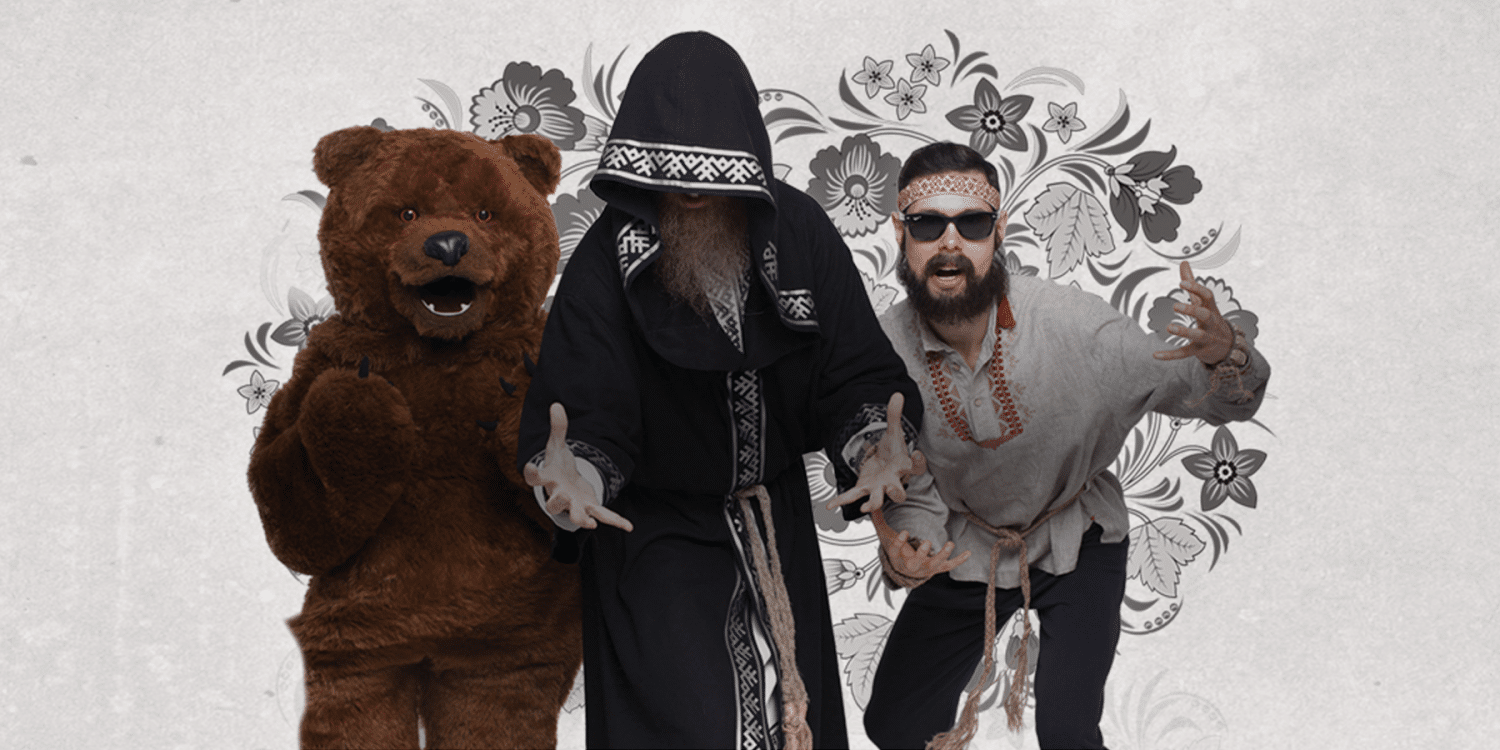Neuromonakh Feofan (Нейромонах Феофан) is a mysterious and extraordinary product of the Russian club scene. The name “Neuromonakh” is derived from “Neurofunk,” a subgenre of drum and bass, and the Russian word for “monk.” The band sings exclusively in Russian, but mixes contemporary language with obsolete words and Old Church Slavonic to create epic verses set to electronic drum and bass mixed with traditional instruments like the balalaika.
Members of the three-man group remain anonymous, but we know the lead singer-songwriter, Feofan, conceals his face behind a hooded robe and false beard, wears sandals, and occasionally swaps his balalaika for a staff with a hidden laser. He’s also quite tall. He’s assisted by DJ Nicodemus, who sports an embroidered tunic and foot cloths, and is accompanied by a guy dressed in a bear costume. They never break character, and refuse to comment on politics, religion, or beards.
The legend of the group, as told by the group, goes something like this: Feofan began as a solo artist in St. Petersburg in 2009. Tired of city life, Nicodemus joined him in 2013 after they bumped into each other in the woods. The duo shared a cup of tea, relaxed on a tree stump and, disconnected from the overpowering rhythm of the city, conceived of a way to marry the fantastic energy of folk music to techno. They wrangled the bear, re-recorded old songs, wrote a few new ones and Neuromonakh Feofan was born.
Their first album, In the soul of drums, in the heart of bright Rus! (В душе драм, в сердце светлая русь!) debuted in 2015. Though many songs were leaked online long before their official release, the album made it to the Russian “Top 10” chart on iTunes during its first week. In 2016, Neuromonakh Feofan released their second studio album, Great Force For Good (Велики силы добра), which remained on the Russian iTunes “Most Listened Album” chart for two weeks. Compared to the never-before-heard innovation of their first album, Great Force For Good sounds relatively monotonous, as if Feofan became trapped in the very style he pioneered.
Their most recent single, “Old Russian Soul (Древнерусская душа),” released in 2017, incorporates aspects of black metal, indicating that they may be heading in new directions yet. Overall, the band’s recipe for success seems to be their ability to be nearly always over-the-top with their presentation of what are well-known cultural tropes and even stereotypes of Russian culture – and yet to never sound like they are doing anything but reveling in a respect for that culture.
A video of Neuromonakh Feofan’s smash-hit Притоптать (Stamp Down):
Lyrics:
Место пахоты затихло,
И осталось поле рыхло.
Дабы радость испытать,
Надо поле притоптать.
Ать, ать, ать, ать, ать,
Надо поле притоптать.
Природа может помогать,
Радость и дары давать.
Дабы принять благодать,
Надо поле притоптать.
Ать, ать, ать, ать, ать,
Надо поле притоптать.
Если рёбра щекотать,
Можно просто хохотать.
Даб в веселье утопать,
Надо поле притоптать.
Если просто так стоять,
(нельзя стоять)
Можно зело заскучать.
(нельзя скучать)
Даб ядрён-задор поймать,
Надо поле притоптать.
Ать, ать, ать, ать, ать,
Надо поле притоптать.
Чтобы хохотать,
Надо поле притоптать.
Даб ядрён-задор поймать,
Надо поле притоптать.
Чтобы хохотать,
Надо поле притоптать.
Даб ядрён-задор поймать,
Надо поле притоптать.
A video of their newest release, Древнерусская душа (Old Russian Soul):
Lyrics:
Многих смен ночи и дня
Знает тайны
Одинокая она
Спит на грани
Вереск пламенем кружил
В колыбели
Месяц холодно любил
Твёрдо веря
И на куски себя разрывает
Все и вся вокруг круша
Не знает как по-другому жить простая
Древнерусская душа
Ливни кутали храня
Беспощадно
В бездну пропастей маня
Тьма стращала
Силою превозмогать
Тягот муки
Выше облака летать
Жить со скуки
И на куски себя разрывает
Все и вся вокруг круша
Не знает как по-другому жить простая
Древнерусская душа
И на куски себя разрывает
Все и вся вокруг круша
Не знает как по-другому жить простая
Древнерусская душа











